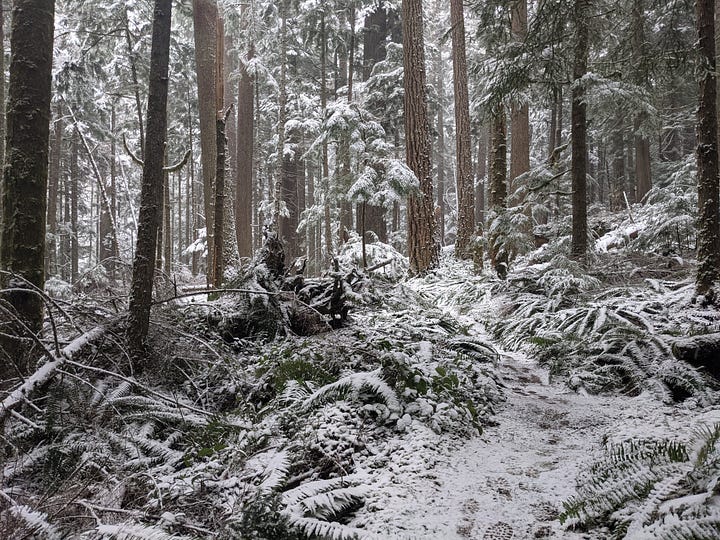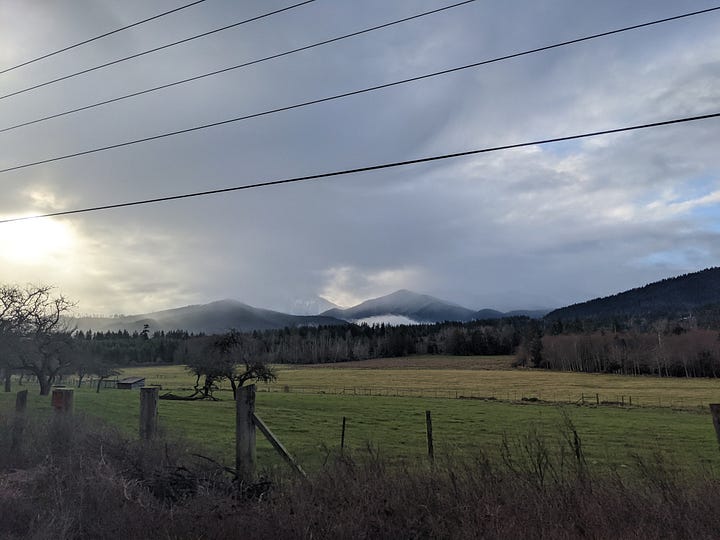A defence of Twilight
Why we read and write
A couple years ago, my brother, dad, and I ended up in Port Angeles, Washington. In February, it is a misty, foggy place, with wild beaches and rainforests and wandering elk, the precipitation perpetually in the midpoint between rain and snow.
We had come for the natural beauty, but when we arrived, I remembered why the name of the town had sounded so familiar. Port Angeles, along with the more-touristed Forks, is the setting of Twilight.
Before we go into the main point of this post, which is about storytelling, I would recommend reading Kate Yoder’s Grist article about the Forks area, the logging industry, and how Twilight tourism has affected the area. It’s beautifully done; one of the best pieces of journalism I’ve read in the last few years.
Also, here are some photos of the area, all taken in the same February weekend! It’s no wonder that Stephenie Meyer wanted to set the series here:




***
This essay is about Twilight, but is also a broader discussion of the differences in what publishing calls “genre” and “literary” fiction. It's a blurry and arguably artificial line, but one you have to pay attention to if you want to try to publish a book. Basically, genre fiction is plot-driven; literary fiction is character-driven. Genre fiction, such as mystery or romance or crime, must hew to the conventions of the genre: to be a mystery, the mystery must be solved; to be a romance, the lovers have to get together in the end. Literary fiction isn't bound to these constraints.
Certain types of genre fiction — think the paperback novels at the library, or Twilight — invite criticism for being poorly written and predictable. It’s clear that some books are better than others and that categorization doesn’t really matter here: Jane Austen's books are romances by the conventions of current publishing, but have more literary merit than the vast majority of what's called literary fiction.
But even lower-quality genre fiction has two things I really admire and are frankly sometimes missing from the more literary novels I read: first, plot; and second, purpose.
Twilight is very good as a story — at making the reader want to know what happens next.
I read the Twilight books twice because they were in my middle school library. I haven’t touched the books since then, but my memories and impressions have remained remarkably unchanged through the years. Back then, as now, I just wasn’t the right audience for vampire romance novels. The prose is serviceable but not great. The romance(s) at the center have many issues. Bella and Edward are not the most interesting characters, but many of the secondary characters and world are — Alice the seer and Rosalie the diva with hidden depths and Leah, forced to hang out with only men in a werewolf pack including the ex who left her. The build-up to the battle was exciting; the battle less so.
And crucially, I read Twilight twice because it was engaging and I wanted to see what would happen to the characters and in that world. I think some of the reason it was such a phenomenon is that people liked the romantic escapism, but part of the reason is that it’s an exciting series where lots of things happen and through the four books you want to know what happens to Bella and Edward and Jacob and their families, what happens with the pregnancy and conflicts and battles.
The most important part of storytelling, I read somewhere once, is that you want the reader to ask “what happens next?” — whether it’s a thriller, or a romance, or a literary novel, they have to want to keep turning the pages. Stephenie Meyer does this brilliantly.
***
I think I’m a decent prose stylist. You probably think this too, or you wouldn’t be here. But when I started to try and write novels, I found that while I can write, and I’ve always had a decent eye for dialogue and characterization, I was bad at plot. I didn’t care what happened to my characters next, so why would anyone else?
As C.S. Lewis writes (quoted here by Clifford Stumme):
Every good book should be entertaining. A good book will be more; it must not be less. Entertainment…is like a qualifying examination. If a fiction can’t provide that, we may be excused from inquiring into its higher qualities.
Naomi Kanakia’s essay on genre vs. literary fiction dives deeper:
The Road and Station Eleven were readable and entertaining on a page-by-page level. Almost all the best works are. The tools of genre fiction are nothing more than tools for moving the reader from page one to page three hundred and fifty-seven. Literary fiction definitely has different tools, and I think those tools can be in productive dialogue with each other, but if you eschew the tools of genre fiction, that is not by itself a praiseworthy choice. You need to offer up something else.
This puts into words a lot of what I’ve been thinking about lately as I try to hone in on “the basic throughline that pulls the reader through the story”, because I do not think I’m at the point in my fiction writing where I am offering something else.
Marissa Meyer is a genre fiction writer who is extremely good at plot, and it speaks to her craft that I’m maybe not her intended audience and yet kept reading through The Lunar Chronicles, her science fiction fairy tales. She’s written a blog series on writing and revising novels called From Idea to Finished. What I really liked about this is it went beyond the broad ideas of hitting plot points into the actual process that she uses as she writes and revises her novels. I go back to this series time and time again as I revise.
***
The second thing that reading more essays on literature (such as the ones quoted above) and thinking about, and crucially doing, craft is the discussion of the purpose of the novel. (I'll link this New Yorker essay again on translating the Russians, because it is great). Reading more about literature has:
Made me borrow more books, which is good in itself , and
Made me think about what I want to read, and from that, what I want to write.
For the other thing about Twilight and other genre novels — for all their flaws, they have some sort of vision and optimism about the world; they have a central moral vision whether you agree with it or not. For all the shallownesss of a spy thriller, the good guy wins at the end; for all the relationship issues in vampire romance, the main characters are in love and end up married.
This is not, of course, limited to genre novels. I’ve written before about 19th-century social novels like Les Misérables; I appreciate North and South, A Tale of Two Cities, Middlemarch, The Brothers Karamazov, and countless more — they all have both plot and literary merit, and might have diverging visions of what the future should be, but ultimately they are hopeful; even when they do engage in deconstruction, they also construct.
I’m not sure I always see this purpose in modern literary fiction, and I realized that this had influenced me. The direction my novel had taken was more cynical than what I wanted to read, or, indeed, even the way I viewed the world. I started rethinking what the third act should look like and writing it in a more hopeful direction.
Happily, the pieces were already there.


I read the Twilight books in about 4 days in preparation to meet the daughter of a family friend who visited from England and was a fan when I was 12. We talked non stop about Twilight, periods, crushes, siblings, school etc for a week and are still good friends over thousands of kilometres to this day! my other Stephanie Meyer memory was writing an essay on how she was a good example of Mormon sci Fi futures for an anthropology class in uni... I maintain that The Host is a very rich text!
I also love these thoughts on the process of writing, I have a shelved genre novel I wrote when I was 19 (basic concept: what if there were student newspapers in a fantasy world) that I want to revise one day and will certainly need some courage and clarity and sense of structure and genre to do!